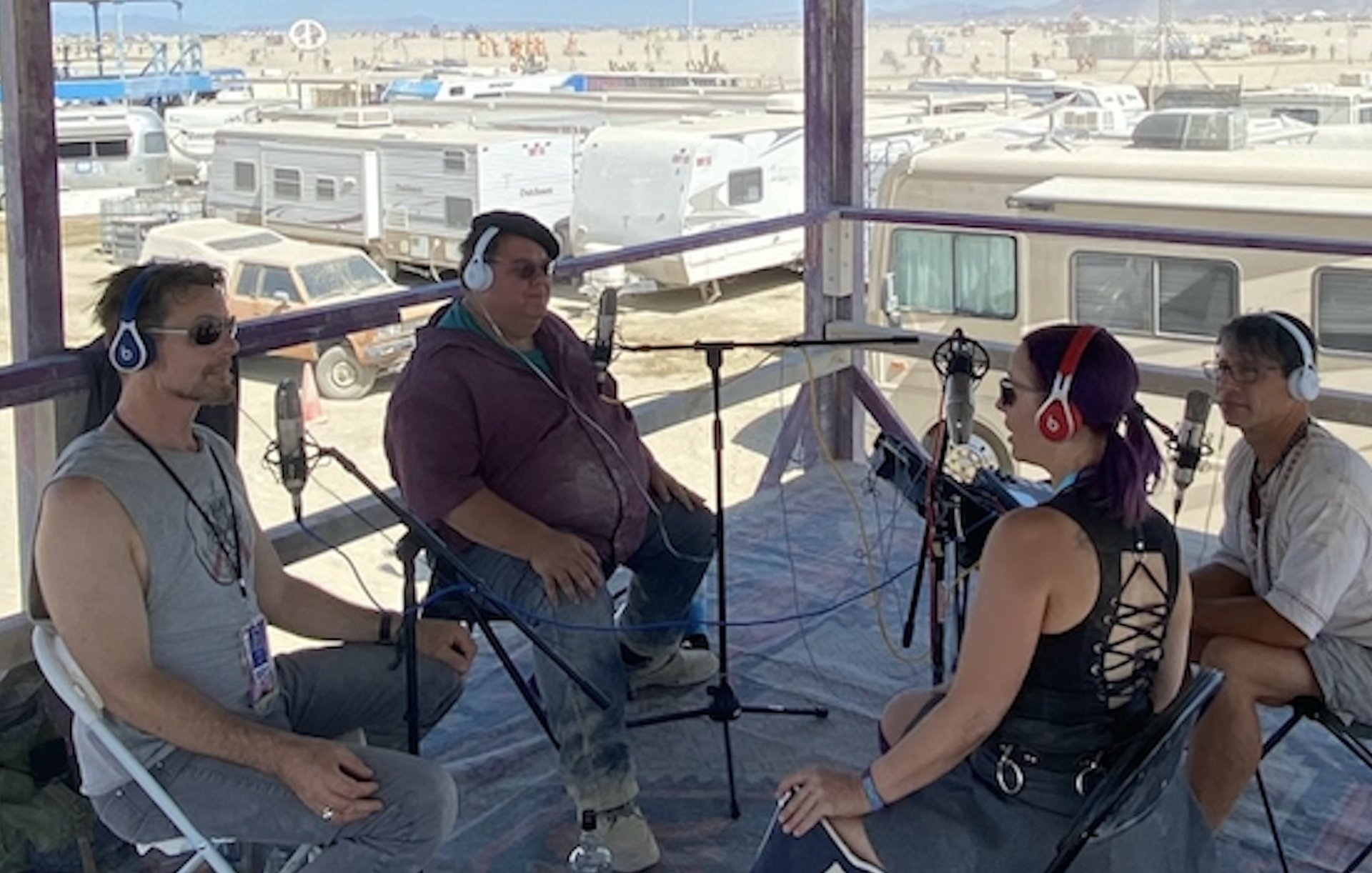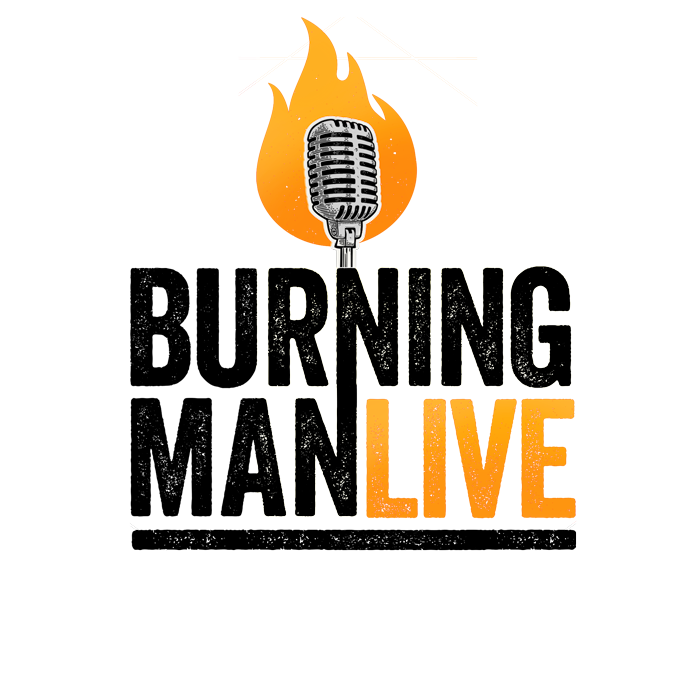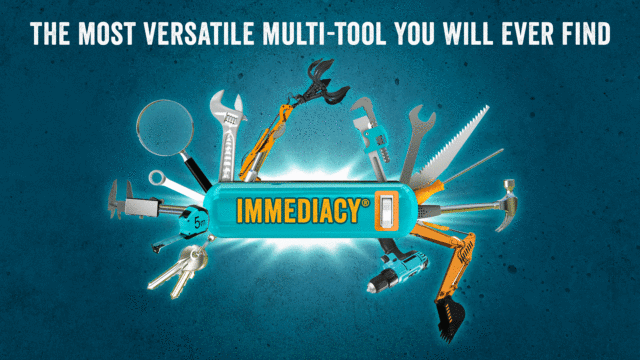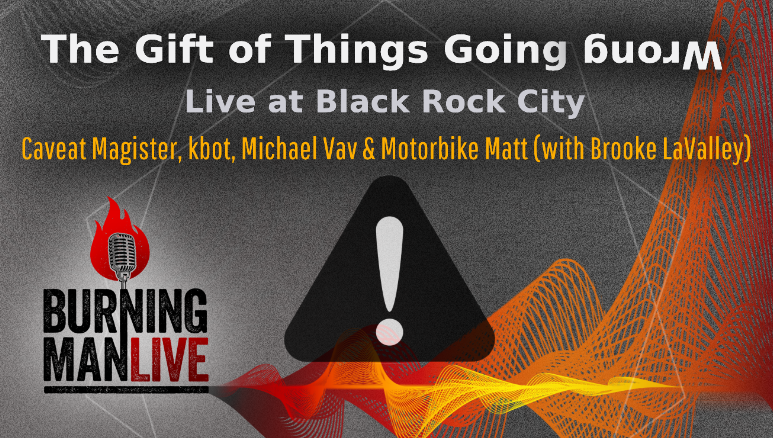
The Gift of Things Going Wrong
Black Rock City. We miss it already. If you miss it too, or you missed it altogether, here are some sounds and sentiments of being there.
BRC is filled with amateurs, people doing it as a labor of love. When things go wrong, we celebrate it as a glorious opportunity to adapt, or simply as things going the way they go. When the going gets tough, spaces like BRC allow for joy, mourning and reflection. Spaces like BRC are practice grounds for new possibilities, and things going wrong — sometimes wonderfully, sometimes devastatingly, often whimsically wrong.
- Caveat Magister is the resident philosopher of Burning Man. From his work with founder Larry Harvey and the underground art scene, he writes books, hosts adventures, and refutes reality.
- Motorbike Matt produces Burning Man’s webcast, and helped create the Mars Rover Art Car and the Black Rock Observatory. He works in deserts around the world, and works it in the Black Rock Desert.
- Kbot is a strategist on Burning Man Project’s Communications team. She develops stories about culture and community, writes her own, and shares the mic on this podcast.
- Brooke LaValley is a longtime Burner and photojournalist, and a maven at Media Mecca (the media relations station in BRC).
- Michael Vav is a longtime organizer, sordid artist of sorts, and behind-the-scenester, and a producer in Burning Man Project’s Philosophical Center.
This conversation is silly and serious, profound and profane. Listen between the jokes for the truth bombs… and the jokes that bomb.
Oh, and see this too: burningman.org/feedback-loop
And this: census.burningman.org
Transcript
VAV: The first thing would be: Let’s do whatever.
CAVEAT: Right. I got this.
KBOT: It’s okay.
MATT: All right. We’re recording.
VAV: Welcome back. Our team is back from Black Rock City, and we miss it already. If you miss it too, or you missed it altogether, here are some sounds and sentiments of being there. Resident philosopher Caveat Magister leads a few of us in conversation… and pretends to be Stuart Mangrum.
This episode is silly and serious, profound and profane. Listen between the jokes for the truth bombs… and the jokes that bomb.
And note: It starts out with background noise, then settles down. Then it goes all over the place, because the place is Black Rock City. Let’s go.
CAVEAT: You’re listening to Burning Man Live. I’m your host Stuart Mangrum, Director of Burning Man Project’s Philosophical Center.
VAV: Wait a minute.
CAVEAT: No, I am Stuart Mangrum, and with me for this edition are Vav, as always…
VAV: Hello.
CAVEAT: … and our guest Motorbike Matt.
MATT: Hey. Hey. Hey.
CAVEAT: and kbot.
KBOT: Hello.
CAVEAT: We were going to be doing an episode about Waking Dreams and Black Rock City as an ephemera, a waking dream, but our intended guest Caveat Magister just decided to flake on us and not show up.
He told us just to think of him as always having been a waking dream, and now we don’t have him so instead we are going to do an episode on when things go wrong, a Burning Man topic close to all of our hearts. One that has been from the beginning and one that our panel has a lot of expertise in I suspect, but first let’s set the scene. Vav, tell us what’s going on around us right now.
VAV: We are here at Black Rock City 2022 against all odds. I think that’s the art theme this year, right? Stuart?
CAVEAT: Yes.
VAV: Great. And we came to Motorbike Matt’s webcast. He’s been doing this for 92 years.
MATT: 92.
VAV: And right when we hit record, a huge refrigerator truck drove up and is sitting right next to us. I think it’s actually on kbot’s foot. They are humming in the background and it’s because things went wrong. First Camp Kitchen has a big refrigerator truck and it died. They brought another one. Now it’s all teamworky in the background.
CAVEAT: They are delivering a huge amount of filet mignon to First Camp right now.
VAV: Yes, those honey drizzled figs with blue cheese look delicious.
MATT: Pretty sure that’s a lobster crawling out.
KBOT: When the lobsters escape, you know you have a problem.
CAVEAT: So let’s talk about things going wrong at Burning Man. Now, I’m sure if Caveat were here, he would point out, as he does incessantly, that he had wanted the title of his book about Burning Man philosophy “The Scene That Became Cities” to be “There Are Only Amateurs” because when things only go right, it means it’s being done by professionals. And the secret sauce of Burning Man, or one of these secret sauces, is that it is not done by professionals.
Even if people are professionals, they are trying new things; they are pushing themselves in new ways. When you bring in professionals and tell them what to do, they do it to spec, and so ideally nothing does go wrong. Whereas when you bring in amateurs who are trying things that they’ve never done before, even if it’s at a very high level, all kinds of things go wrong and inspiration and magic and growth, therefore happen.
VAV: And love.
CAVEAT: And love. You’re right. He would have forgotten the love.
VAV: Well, because “amateur” something, something about the language.
CAVEAT: Right.
VAV: Etymology, entomology, something.
CAVEAT: Let’s assume big words were used.
VAV: Yes.
CAVEAT: This is something that our panelists have a lot of experience with, such as Motorbike Matt, who has been doing the webcast for 129 years.
MATT: 129. This is actually 130. And about half of them have been complete failures.
CAVEAT: Tell us a little about your experience at Burning Man with things going terribly wrong.
MATT: Oh, well. I think my first big failure actually was in 2013 when we had a mutant vehicle called the Mars Rover Art Car. We were going to come out and we were going to do explorations over video and we were gonna take a microscope and look at fairy shrimp and broadcast them back. And then The Org said, no,
CAVEAT: What happened?
MATT: What happened was, is that in 2012, there were some concerns about roving cameras and peoples’ privacy about having a camera looking at, you know, things that people didn’t want their cameras to be focused on.
VAV: Like MOOP.
MATT: Like MOOP, exactly, and BOOB, and other things like that. And so, when I came out and said, I wanted to do that, the Media Mecca Comms Team said, “Not exactly a good idea right now.”
CAVEAT: And so what did you do instead?
MATT: Well, what happened was is their camera broke, their camera failed. And after they said no to me, they came back and said, “Hey, Motorbike Matt. Remember when we said no about a roaming camera? Um. Could you actually fix it for us so we could use your camera instead?”
CAVEAT: So what cascading failure led to a success?
MATT: Exactly. That is the story of my success here. Usually I need about that third failure and it turns around. So it’s: I’m winning. I lost I’m winning a lost, and now I’m finally, maybe I’m kind of getting there.
CAVEAT: That’s an important lesson for us all. Now, kbot, you’re involved with the Comms team.
KBOT: Yes, I am.
CAVEAT: The people who said no to Motorbike Matt in 2013, who crushed his dream.
KBOT: Well, yeah, I mean, having crushed dreams is just part of the process, right? If we don’t come in and crush your dream every once in a while, then you can’t rebuild your dream and make it better.
VAV: You get too comfortable and…
KBOT: That’s it.
VAV: …Burning Man is not about comfort.
KBOT: No, no, no. We probably looked at Matt and said, “This dude is too comfortable. How can we fuck him up?”
CAVEAT: Now, have you had a project or a dream or a passion that has been crushed on playa only to be reborn like a dusty phoenix?
KBOT: Yes. Okay. So my first Burn in 2004, we decided to build a dome, and that dome was made of bamboo. And I think I’ve shared this story before, but we successfully built it in the park in Canada. And then when we brought the dome out here, of course, all the bamboo just shredded and blew all over our camp in a big MOOPy mess. We were dehydrated and very depressed.
VAV: And the bamboo was dehydrated.
KBOT: Very, very dehydrated. Did it become a success? Yes, because we continued building domes and we continued learning as everyone builds domes out here. And now I have a camp that’s all domes. Now it’s kind of dome override, like there’s too many domes. What do you do with all that dome?
CAVEAT: Your success has turned into failure.
KBOT: Yes. Empty domes.
CAVEAT: Now all those damn domes sitting around the playa.
KBOT: Oh, and storing the domes and moving the domes and replacing parts on the domes. I mean, it’s kind of too much now.
CAVEAT: You know, what we need is fewer domes.
KBOT: No more domes.
CAVEAT: Can we get on that?
KBOT: I’m on it, yeah, for next year.
CAVEAT: Fantastic.
MATT: What about pyramids?
KBOT: Ooh, pyramid power. I like it. You know, there’s a whole movement of dome power from the seventies and then there was pyramid power. Channel that energy, concentrate it.
CAVEAT: Now, Vav, you’ve been involved in Burning Man for 20 years, 25 years, right?
VAV: 25 years, yes.
CAVEAT: And the Cacophony Society as well for 93 years prior to that. What does failure out here mean to you?
VAV: Failure is predictable. Failure is what we are here to learn from. Yeah, failure’s the learning point. I try to stay uptight as long as I can when I get out here, I try to stay on task and make everything work the way that it could. And then it just beats me down and I finally crack and give up right about on Thursday of the week, which is what today is, of Burn week.
KBOT: Have you cracked and given up yet today?
VAV: Yes.
KBOT: I’m proud of you.
VAV: I started giving up when kbot showed up in a cast because her leg gave up on her before she got to playa.
MATT: Total fail.
VAV: I was all ready to schmooze Caveat and get his autograph and give him a bunch of swag, and he just never showed. So all I have is Stuart to hang out with here today.
CAVEAT: You know, Caveat’s just the pretty face of the Philosophical Center.
VAV: True.
CAVEAT: Does it get more interesting after the player breaks you down?
VAV: It definitely does because I start being the cowboy that you are, Stuart. I start just rolling with the punches, imagining how it might unfold without me, or without my little spreadsheets and my checklists. And you know what I can put in half the effort and get the same results, so why was I putting in all that effort? I sure hope I never forget this lesson. Oh, I probably will. Next time.
KBOT: Yeah. The cycle, right?, of relearning. and especially after a three year break where we forgot a bunch of stuff or we’re just different people now. So if we were doing consistently the same thing year after year, maybe there’d be more progress, but I feel like there’s, at least in my case, been a little bit of backsliding where I’m like, wow, I need to figure this out all over again.
MATT: Yeah. I think I’ve been in a weird space with all this too because for the past two years, we actually managed to go out and record and broadcast a Man Burn off the Hualapai out at Fly Ranch. So I’ve actually been in my container every year on schedule, as planned. I’ve been able to use this stuff with my crew with Andy, with Sinatra, today.
So coming in I’m all fresh and have these wrong expectations of like, oh yeah, my stuff is ready. And I came in a week early to make sure that; it was like, “I’m not gonna be the one who’s gonna screw everybody up.” And I wasn’t.
CAVEAT: That must feel good.
BROOKE: Hey guys, Hey, I’m so sorry to interrupt you. I just need to let you know: several sparkle ponies have escaped animal control. They’re trampling people out on the playa. We really need you down there.
CAVEAT: Oh. Why don’t we get DPW on the radio, have them get some wagons from wagon camp and circle them up.
KBOT: We need the lead sparkle pony wrangler stat.
BROOKE: DPW has already refused to help with it.
KBOT: I just wanna watch. Can I just watch?
VAV: Don’t they know the value of a captured sparkle pony and how you can milk them.
KBOT: Tame them.
CAVEAT: If we can’t get DPW, we can just get Gate. It’s all the same thing, right? I’m Stuart Mangrum, director of the Philosophical Center!!!
BROOKE: The stampede’s moving toward Gate right now. They formed a human wall. So it should be interesting. I’ll let you know how it works out.
CAVEAT: Yeah. Let’s… We’ll keep track of that. Sorry for the interruption. You are listening to Burning Man Live. We just had a sparkle pony related emergency, but it is live at Black Rock City with Motorbike Matt, kbot and as always Vav.
So it seems like a lot of people have had that experience of coming back here and finding things failing in part because they have changed. To go back to another Burning Man theme: Is failure a necessary condition of metamorphosis?
KBOT: Well, the butterfly is goo. It’s a caterpillar. Then it turns into goo and then it becomes a butterfly that the goo is kind of a messy, sticky failure temporarily, right?
VAV: The chrysalis is a failure?
CAVEAT: If we’re not changing, are we not..? There will only be no failure if we are not changing.
MATT: That’s right.
VAV: Well, to quote all of my very wealthy tech entrepreneur inventor friends, you know, “Fail forward, fail often.” So I guess that’s what we’re out here to do, is to have great expectations and then have the burn that we have, not the burn that we want.
KBOT: and to let go of perfectionism which is really pervasive in our culture.
CAVEAT: I think perfectionism is the enemy of inspiration.
MATT: Yeah. If you’re always focused on what you believe is perfect, you’re throwing out all the other opportunities, all the other outcomes that might actually, and most likely, are better than what you originally came up with.
CAVEAT: This must be something that you deal with a lot Matt, is having to constantly jerry rig systems out here.
MATT: Yeah. It is actually fun. most of the stuff that I’ve ever brought out here has been used stuff. So I know the person most of the time, and I trust that it works. For example, this actually was working even better before everybody came, and then of course, just when you plug things up as to use it, it doesn’t work like it was supposed to.
But I think that having those kinds of reflexes to be able to respond to failure, allows you to be more creative. Because now I have new ideas of how, you know, we could do it inside that refrigerator truck, and eat at the same time as we’re doing this.
CAVEAT: That’s genius.
VAV: And finally get to wear our cool clothes…
MATT: Exactly.
VAV: … that we brought for the cold nights, which have not been cold. So all my cool furry jackets or whatever, actually my three piece suits that are too hot to wear during the day, I could wear them in the fridge truck when we record.
MATT: That’s right.
VAV: I’ll look dapper for this audio program.
MATT: Yeah. You know what they don’t know is that it I’ve actually broke the refrigerator truck explicitly to get in there, but oh well.
CAVEAT: They criminal masterminded you.
VAV: They fixed it too soon.
CAVEAT: Something that also has struck me as this burn has been going on, and as so many things have been going wrong, is the realization that, which I think I’d forgotten over the years, that Burning Man crises are very intense. We feel them very intensely. But if you can take a step back, the stakes are usually very low. Actually very little is really at stake. We are just so in it and feel so intensely about it.
MATT: From the webcast perspective, I feel the burden of like, thousands of other people who couldn’t make it to the playa for whatever reason, maybe they hurt their leg, maybe they, financial or whatever, all these other reasons. So I definitely feel a big burden to try to make sure that we provide that kind of opportunity for them to be a remote participant. The most amazing thing is that they’re also the most forgiving people. They see just even a blurry picture of a drone in the sky, or of the Man’s neon at night, and they’re just showering us with love. And that is where you can’t fail, even though I’m desperately trying. It’s been what, 173 years now?
CAVEAT: it’s 204.
MATT: 204. I forgot about those last 30, I think that you’re right about the stakes being low in reality, but in our hearts and our minds, it seems like it’s high. And that’s the wonderful part is because we get to break our egos out here, and realize that no, actually you can still get by and do good enough and still express creativity and bring joy.
CAVEAT: Something that makes this environment unique is that we are so, not only forgiving of failure, but often welcoming of it. There’s a way in which, if you try something and fall into the dust flat on your face, there are lots of people who first will applaud, but then who will stretch out their hands, offer to help you up, dust you off, and see how you can do it better next time. There’s an embrace of that aesthetic of, “Well, of course something went wrong here.”
MATT: Yeah. And you get better burn barrel stories, when everybody’s talked about, “Hey, I screwed this up. Wasn’t that funny?” “Oh, I did worse than that!”
CAVEAT: Those are staples out here. Absolutely.
KBOT: Yeah. And the idea of in, you know, non-Burning Man life, that there’s shame that accompanies failure and mistakes and things getting messed up, and, you know, you’re trying to fix your mistake. There’s something really liberating about the transparency of a mistake here, where you can’t hide it. It’s in front of everybody most likely. And there’s no point in trying to like, “Oh, I’m meant to do that.” It’s a sort of open secret that things aren’t going the way you intended, and that’s where the collaboration comes into play.
VAV: Well, I was going to say the whole thing about the refrigerator truck noise in the background was just a ruse, because we’re actually flying in a plane to Burning Man right now, to Black Rock City, and we’re all going to parachute out, which is… In a way, I’m glad Caveat’s not here because he really does not like skydiving, not after that thing that happened last time. And you know, “fail forward” or “learn from your mistakes” doesn’t go well with skydiving.
CAVEAT: The man cannot handle his vertigo.
VAV: Yes, But there are a lot of people applauding in the background that doesn’t make sense for an airplane, so I’m not sure what the story is going to be here.
CAVEAT: Somebody’s very happy about something that’s happened on that refrigerator truck.
KBOT: I see one empty one and one full one. Now they have moved all the food from one to the other, and now they’re celebrating their glory.
VAV: Yes, there are the obvious things that go wrong out on the playa; It’s so dusty, your combo lock stops working. Your generator stops working, your refrigerator truck. But also so many burns may be postponed because of weather. That’s just the background of workability not working, that will hopefully humble us and help us manage our expectations. But we’re still disappointed.
KBOT: But the mad hustle, when something goes wrong in a big way, such as a burn not being possible and the huge effort where everyone comes together to do it again better elsewhere. That’s beautiful. So there’s this acknowledgement that something didn’t happen as planned, and then there’s either a ‘let it go’ because that’s just what we have to do, or everyone comes together and tries to make it right. That I love about Burning Man.
CAVEAT: I think the point that our culture handles failure differently than other cultures, or than our culture broadly, is an important one for us to think about. When we were doing the 2016 theme series on Art, Money and the Renaissance, one of the things we realized was that Renaissance Florence had an amazing art culture and so much of it was dominated by competitions. And competitions of course mean that most people who make art proposals are not going to make it, they’re going to fail. But what Florence did differently from what we generally do is that there was absolutely no shame attached to failing. It was seen as a perfectly normal part of the process. And so there was no reason that you had to succeed or else.
If you failed in interesting ways, you were going to accrue glory. You were going to get noticed. You were going to be seen. And so people were putting their most creative best feet forward, as opposed to playing it safe and trying to make sure that they won, because everything depended on that.
And that we realize is very different from the way failure is often handled in the culture of the world that we live in, where the stakes seem so high, because if you don’t get the grant, if you don’t get the job, if you fail in so many ways, then your livelihood could be lost, then the stakes, rather than being low Burning Man stakes, are actually very significant stakes. And so there was a way in which a Burning Man culture that recognizes failure and welcomes it and accepts it, allows for much more creativity to flourish and for people to learn from their failures much more easily.
MATT: Well, that closed the door on that conversation,
VAV: That huge robot just fell over into the clown car. I hope they’re all okay.
KBOT: Oh, uncomfortable silence. We’re all watching the robot and the clown car and it’s very amusing.
BROOKE: We have an announcement, breaking news just came over the radio, the peanut butter art car just crashed into two chocolate camps. People are very upset. They’re also overjoyed, so…
CAVEAT: What a delicious tragedy.
KBOT: Mmmmmmm
BROOKE: It’s delightful.
VAV: I wouldn’t have expected those two flavors to taste good together.
KBOT: It’s so sticky and melty, and so good.
CAVEAT: We need to get Resto out there though, don’t we?
BROOKE: Yeah, we have a dairy camp on the way. So they’ll be doing work pretty quickly…distributing it to the rest of the burn.
CAVEAT: OK. It sounds like that’s being taken care of. OK.
VAV: A dairy camp.
CAVEAT: Well, I want to hear about the failure that you most learned from in your lives, the failure that you most learned from, whether out here or elsewhere in the world.
MATT: For me, the one that probably stands out in my life: I had a really bad week and it was transformative because, it ended up being the end of a relationship and a lot of expense. When I think back to it, everything was because I was trying to go too fast. I was trying to get too much done too quickly and expecting it to be like everything that fall in place. And then the problem was that everything had dependency on the thing prior being successful. And when the one mistake happened, there was no way around. I was too inflexible, too far beyond repair, because it was like, well, that’s not gonna work and then I’m not gonna make it to this, and then I’m gonna miss that flight and then, oh, that opportunity got lost. So I think going too fast is always the lesson that I always have to remind myself not to do because I keep doing it sometimes.
CAVEAT: “Don’t go too fast,” is the lesson learned?
MATT: Yeah, don’t go too fast, even though I constant, you know, persistently, always moving too fast with everything, but I get more and more reminders of that one cascading failure. And so then I’m like, okay, I’m gonna take a deep breath. I’m gonna make sure: can I do step three without step two? Because that’s probably not gonna happen? And that’s how I kind of get through things nowadays.
CAVEAT: Good. kbot?
KBOT: I don’t really have a concept of failure. To me it’s always a journey. I mean sure, like when like your dome fails, or you lose your passport at Burning Man or whatever, like that kind of thing is like, yeah. Okay. That’s a failure. But in life’s journey, I’m really a glass half full person.
But the one thing that did come to me that I kind of consider a failure and that I struggle with regularly is that I struggle to learn to drive a car. And the weird thing about me is I can do extremely complex things. I can figure out really hard puzzles and challenges, but when it comes to really simple things like adulting, like driving a car, it took me years to get my license again after maybe 20 years of not driving a car.
And I still don’t drive in a way that I feel comfortable with. But the flip side of that is I’m a walker and I will memorize neighborhoods and walk everywhere and explore every little nook and cranny of where I happen to be or live. And I think that that’s the sunny side of that, not driving. If I was just driving a car everywhere in my life, I wouldn’t have the intimate knowledge of my surroundings that I do.
CAVEAT: You’ve learned to find alternatives.
KBOT: I would love to just pack up my car and drive to a Burning Man regional and do that autonomously. I always have to rely on other people and that journey can be amazing and that journey can also be fraught with complexity. So I’m still working on it. And I expect within 12 months that I will be able to drive myself to a Burning Man Regional, but I don’t really know.
CAVEAT: Do you think that will change the relationship with walking with neighborhoods?
KBOT: It could, because there may be times when I’ll drive out of convenience instead of taking the slow way somewhere and planning. I always bake in time for the journey. And if I’m cutting that journey by a third and just getting there, yeah, it’s gonna change my relationship with my surroundings.
CAVEAT: There are often unexpected consequences to success. That’s something that I think we — our culture broadly — is very bad at articulating and recognizing.
Vav, personal failure, what you learned from it.
VAV: Well, Stuart, we’ve crossed paths off and on since the mid 90s, but we’ve been working together here in the Philosophical Center a couple years, so you, it’s obvious that I don’t make mistakes. I don’t have failures. To you it’s obvious because you’ve watched me.
CAVEAT: Every day. I’ve never taken my eye off you. You don’t know about the spyware on your laptop.
KBOT: Oh goodness.
VAV: I don’t? About half a dozen years ago, I was out here doing build week and a few friends and I jumped in the car and did a rocket run to a hot springs over there, at the base of the mountain. It was the last time we could do it before we shut down Perimeter. And, we had a great time at the hot springs. And then as we drove back my sense of direction that I’m so proud of, so good at knowing where I am and how to get back, it failed me somehow. It’s always there except for when it’s not. And I could not find Burning Man.
So I worried and I thought all about me. I don’t know where I’m going. I’m embarrassed. I’m lost. I hope this turns out right. But I had a walkie-talkie radio with me and I started hearing Perimeter talking about ‘a bogie out on the field.’ They were talking about me, and they started saying, “Now he’s going the wrong way. Now he’s going north. Now he’s going east.” And I listened to them talk about me, and that guided me in and around the airport and in through, back into camp. So the learning there was: I don’t always need to know what’s going on, I just need to have a team that knows what’s going on and we’ll all make it together.
CAVEAT: Sometimes we rely on other people in ways that we can’t rely on ourselves.
VAV: Yeah.
MATT: One thing I’m really happy about with the past couple years is that my Black Rock City experiences have been inside of a container for the most part. And now that I have a team like with Dany Rambles and with Sinatra, Andrew Ganzon, I’ve actually been able to go back to Burning Man.
2013 was my best prior burn. And then I started doing the webcast and I’m like, “They’re okay. They’re good.” And in 2019, these guys came in, guys at gals, and then all of a sudden I had the best burn ever in 2019.
CAVEAT: This is one of the things that we need to keep in mind when we talk about one of our 10 Principles, Radical Self-reliance, which is it exists in conjunction with all of the other Principles, including Communal Effort.
We want to emphasize Radical Self-reliance, but we also want to emphasize doing things together and working with teams, and we’re not just doing one or the other; we’re doing both. We want people to have as much individual agency as they can, but we also want people to build infrastructure and connections and do things together that they cannot do on their own.
The two are not mutually exclusive. On the contrary, they can support each other. Infrastructure can support Radical Self-reliance, Radical Self-reliance can support infrastructure. People who see things going terribly wrong can be self-reliant and jump in to fix them while having structures in place can help people be self-reliant who otherwise wouldn’t be able to.
MATT: And that’s my biggest lesson actually, is that now that I’ve sort of gained trust, or maybe I’ve opened up to trust people more. I’m more confident that the stream and the webcast will be taken care of, and then I can go off and wander. And that’s been happening more. And so it’s been a refreshing opportunity, to kind of re-experience Burning Man.
CAVEAT: And I’m going to guess that it doesn’t make you feel one less bit self-reliant.
MATT: No, not at all.
CAVEAT: More self-reliant, if anything.
MATT: Far more.
CAVEAT: Self-reliance can be enhanced by Communal Effort.
MATT: Absolutely.
VAV: So you’re saying that 10 Principles are not 10 check boxes I need to complete, like 10 pieces of a puzzle, and I become a whole complete Burner? They’re actually just 10 different distinctions that were identified through observation and documented, and some have tensions and some are complementary and some are not?
CAVEAT: Creative tension is at the heart of the 10 Principles, Michael Vav.
KBOT: I was trying to collect them all. I guess that’s not right.
CAVEAT: Oh no, you need them all, but they exist together, all happening at once. You can’t break them apart and say, “Well, this is gonna be where the Radical Self-reliance is, and this is gonna be where the Participation is. This is gonna be where the Radical Inclusion is.” You have to have them all operating at the same time.
VAV: The 10 Principles: Collect them all!
KBOT: I’m just gonna interject that Fab 5 Freddy keeps walking around below our deck and that’s really cool. Carry on.
VAV: Maybe he’s lost, which is a failure, which is just a success in waiting.
BROOKE: I just came up here to tell you guys that, that sound you just heard is the warning signal. The hippie traps are all full. They’re actually overflowing into Death Guild right now. I need you guys to maybe get on your radios, help me out with this.
CAVEAT: Have we caught all the hippies?
BROOKE: Yes. The fur is actually clogging the sewer drains of the city, the fake fur, right now.
KBOT: Oh dear. I think Burning Man is over.
CAVEAT: Our work here is done. We’ve never got all the hippies this early before.
VAV: We’re over quota. This is great.
KBOT: Pack it up.
CAVEAT: This is failure through success.
MATT: I can zoom in on art.
VAV: Hmm…
CAVEAT: So we’ve talked about our personal experiences of failure. Now about Burning Man’s failures, significant failures in Burning Man history that turned out to take us somewhere interesting.
I always go back to the 2016 Man, the turning Man for the da Vinci’s Workshop, which had to stay upside down. It was supposed to be a turning Vitruvian Man that, you know, participants could crank a wheel and it would rotate on its axis, and it would be very participatory, but it did not work. And in order to avoid the whole thing self-destructing they had to leave it upside down for a number of days. Rather than create a sense of depression, sadness, failure, among the participants, everyone took delight in it, and it became a symbol of how it is okay to do something ambitious and end up metaphorically and literally on your ass. In this case…
VAV: On your head.
CAVEAT: Yeah. And it has turned into, I think, a very useful symbol of part of what we do; that, yes, it’s okay to be ambitious. It’s okay to dream big. And it won’t necessarily go the way that you want it to go, but look, something delightful came out of it anyway, and it’s okay. Again, the stakes are often much lower than we think they are, even with something as big as the Man. That’s what occurs to me. What occurs to you?
VAV: Well, I love that, that it was a huge visual on the horizon for everyone, the icon of the event being upside down, being not the way it was designed to be because it got stuck that way. And it was because all of the wood in all of the gears, all of the process that they tried to design, changed when it got out into the arid desert. If only they had talked to kbot about what happened when they built a dome with bamboo, and then it dried up like astronaut ice cream. You could have told them, but you know, you wouldn’t have, because they needed to learn from trial and error.
KBOT: Well, yeah, nobody asked me. I was right there saying, “Guys, guys, I have information for you,” but…
VAV: They were like, “That’s that chick who’s dome went crazy, though,.
KBOT: She has no credibility. We’re not asking her.
CAVEAT: That’s Dome Lady.
KBOT: Dome Failure Lady!
CAVEAT: Don’t talk to Dome Failure Lady.
KBOT: She doesn’t know.
MATT: You don’t have a Twitter account? You didn’t put it out there?
KBOT: No, definitely did not.
CAVEAT: Failing on the internet is its own topic.
KBOT: Oh boy.
CAVEAT: The internet is simply less forgiving.
MATT: Yeah.
CAVEAT: And that’s the problem. We are forgiving here. We celebrate failure. We recognize that we’re all doing it and all learning from it. And the internet goes differently.
KBOT: I would say an interesting failure of Burning Man’s is that we became a victim of our own success. And when the ticket started to sell out, and Instagram culture picked up, a lot of organizations would think that that was success. If it was Coachella or some other big event, obviously it would be like, “Hey, we’re selling out, and then models love us.” But that was a cultural failure that we took years to manage and understand. And I think we’re getting there now.
I think that this grassroots event that became a sort of sensational thing is kind of reverting back to its grassroots self. That’s what I’m seeing. And it’s very encouraging. But I think that without a few years of hype, we would’ve never understood the risks of that, and what it could really do to us as a culture.
VAV: I think “grassroots” and “amateur” is the same general idea. You make what you can with what you have, and you love it. And it is what it is.
CAVEAT: You’re doing it because you love it, yeah. Labors of love are always going to be different than professionals working to spec. It’s always gonna have a different quality. The stakes are gonna be different. The feelings are gonna be different. You’re always gonna push yourself in different ways. And you’re never going to accept the time to stop. You’re going to give a labor of love 100% in a way that you very rarely do if you are doing something just to get it done, just for the paycheck.
MATT: True. One of the things that I see that… I don’t want to call it a failure so much as just an opportunity that needs to be taken advantage of: I don’t see a lot of young people. I see young people, but I don’t see a generational shift. I don’t see a good handoff. I see a lot of interested and self-motivated people, but I’m not sure I see something where we’re growing at the rate of acceptance in society amongst people that are more accustomed to the tools of communication that we have these days, like you were talking about, Instagram.
There’s so much distraction in the world and somehow we need to find a way to cut through that distraction in the real world, not just here. Here we like the distraction. “Oh, squirrel. There’s this art.” Or we don’t keep time; it’s playa time. I’d like to figure out how we can bring more young blood into, not only onto the playa itself, but also into leadership and into planning in Regionals as well as into the heart of the Org itself.
CAVEAT: This is a question of Radical Inclusion in many ways, and part of the difficulty with that comes from the fact that our community is very much pushing in the other direction in a lot of ways. Let’s restrict tickets to long-standing Burners. Let’s restrict tickets to existing theme camps, and the people who have done this a lot. And, that’s very understandable and it creates a sclerosis if you’re not careful.
Radical Inclusion is in many ways the lifeblood of a new creative movement. Gary Warne, the founder of the Suicide Club, actually left the Suicide Club after a few years because he felt it was too insular, because it wasn’t bringing new people in. Whereas the motto of the Cacophony Society was “You may already be a member,” as inclusive as possible. So that’s the intention in our culture right now: How do we support and even reward people who have been doing this for so long and given so much, while also bringing so many new people in who we need?
KBOT: Yeah. And one of the things that is really exciting to me about this culture is the teaching and learning that comes from elders. And that’s rare. It’s rarer and rarer in consumerist, contemporary society that we respect our elders and what they’ve been through, and what they can teach us.
And here in Black Rock City, and in Burning Man culture in general, we have that in spades. The only problem is there aren’t enough people to learn from us at this point. We’re kind of a culture of elders. We’re getting there.
CAVEAT: I think something shifted. It was on its way before, but something really changed with the 2016 presidential election where everyone felt an enormous sense of crisis in the world, and had a feeling that they had to do something essential about it, that all the essential work had to be focused on that. I remember in 2016 or 2017, our errant guest Caveat, did a panel on politics, at the GLC. Larry Harvey was on it and he said, “We’re gonna tackle this head on and talk about what Burning Man would mean as a political movement, what its options are and what they aren’t.”
And the panel was something of a disaster because the crowd just wanted to say things. They didn’t want to hear a nuanced discussion about what we can and cannot do. They said “You need to live up to the urgency of the moment now.” And so eventually the, he just sort of stopped having a panel discussion, and he said, “Okay, come up on stage, tell us what you think we need to hear.”
There was this real sense of new urgency that said that anything that seemed frivolous, like perhaps Burning Man, might not be relevant anymore. There was a turn towards the very activist, the very hard-edged in politics. You know, everything had to be relevant to this. And I think what we have learned after four plus years of apocalypse, is that in fact, while it is important, it is crucial to directly address these systemic issues that; the apocalypse grinds us down in ways that makes the frivolous all the more important; that in fact, we have to preserve our capacity to be joyful, to not become boring and stupid in the way that the apocalypse tries to make us all one dimensional. And that in many ways, things like Burning Man, which for about, you know, for a period of four years or so, we really had to argue, no, we’re still relevant. No, you know, this still matters. People are coming around and realizing, yeah, I have to do something to not become reduced to a level of political bullet points. I have to have access to an inner life that involves waking dreams that involves the potential of personal failures, as well as activism to address systemic collapse. There’s a turning point here. At least. I certainly feel that in myself, in my life.
KBOT: Yeah. And Burning Man is becoming a place where we don’t only come to fill up our cups and refresh, but we’re coming up with viable solutions. I mean, with climate change, we’re obviously going to have to shift to diff different technologies. And there are thousands of people out here right now testing out technologies that don’t rely on fossil fuels, and that’s huge. And that does trickle down into the culture.
VAV: Testing them in an extreme environment, in a civic environment, so they can iterate it rapidly. Yes.
CAVEAT: Now there’s always been this element of Burning Man being a place where things get prototyped and very useful new technologies, approaches, innovations come out of it. But I think the argument that burning for its own sake is something that we need, that we should not reduce ourselves to a place where solutions happen, but rather remind ourselves that we are a place where we come to play and rediscover ourselves is becoming recognizably important again.
MATT: Being whimsical brings joy. And it’s hard to be whimsical when you’re being ground down by the apocalypse, and so forcing whimsical back into your life, the joy will still be there and remind you that it’s not quite the apocalypse, that we can actually power through it.
CAVEAT: And we are more effective in the things we want to do in our life when we are not one dimensional, when we become more than the traumas the world is inflicting on us.
KBOT: And we don’t need to compartmentalize. I mean, we can be whimsical and develop solutions at the same time.
VAV: When more is being asked of us in the world, it’s not the time to cut out ways to regroup, ways to get grounded and centered, ways to come together in community, or blow off steam or discharge that stress, and one way to look at Black Rock City and other Regional events: That’s part of what we’re doing out here.
KBOT: And yeah, that comes back to a revelation that I had in 2019, where yes, one night I went out to a sound camp and partied my ass off. And in the middle of it, I realized that when there is cultural change, there needs to be a release valve. If you don’t have that release valve, then we don’t have enough energy and impetus to support the work that we’re doing.
It’s all part of the same thing. Every single era of massive social change has come with its kind of Bohemian celebratory side. You can’t really have one without the other.
CAVEAT: Learning how to cope with failure and cope with things when they go wrong turns out to also be an essential skill for surviving mass cultural change, for adapting to it, for thriving in it.
VAV: Another thing we’re doing out here is we’re practicing for the apocalypse. In 2005, I was out here. Hurricane Katrina hit the Southern border of the U.S. and hundreds of people left from Black Rock City straight down to Louisiana and other parts of that area, and started doing hurricane relief in ways that the national support structures weren’t ready for, surprisingly, because people out here were ready; they practice it. And one could argue that similar work was being done around our political issues or other things from the Me Too Movement to Black Lives Matter.
KBOT: Yes.
CAVEAT: One of the things I think it’s important to remember that they brought with them, that they did when they were doing this post-Katrina relief work was that after they demolished homes that needed to be demolished, after they gathered a refuge, they built effigies and they burned them. They included art and whimsy and ceremony as part of that. And that they brought this ritual, this ceremony, this introduction of art where it wasn’t strictly speaking needed, helped connect them with the communities that they were a part of and helped keep them in cohesion as they were doing the work and made it an experience that went beyond just: “Okay, we’re here to help,” and rather turned into a profoundly human experience.
I think it’s important to recognize as we talk about the connection with art and activism, that they brought art with them, not as a thing that was optional, but actually was essential to the work they were doing.
VAV: And very helpful for the locals who weren’t able to conjure that on their own.
MATT: You know, it’s actually funny, in 1992 this week was Hurricane Andrew, in Homestead, Florida. I was actually in the house with my family as it was being torn apart. We ended up in the closet together, my mom, dad, uncle, my brother, the dog in the kitchen, and the two cats who always hated each other conveniently located in the bathtub. And we lived in basically this kind of environment except the dust at that time was drywall and fiberglass. That was the, one of the bigger campsite, you know, let’s call it refugee camp living in a way. I sort of always lean back to that as a reminder, the hardship of that one year of my life always having been so difficult, makes this actually pretty darn easy. I always kind of connect that experience and that hardship as something that wasn’t a failure on our part. We actually were radically prepared for, at least a month after, then we needed help. But having gone through that level of suffering, and being reminded of that is something that. Makes me appreciate the good fortune that I’m able to have the rest of the year.
CAVEAT: Things going wrong as useful perspective for the rest of your life.
MATT: Exactly. Yeah.
BROOKE: Breaking news out of Black Rock city, the Man is gone.
CAVEAT: What?
BROOKE: He’s gone.
KBOT: Well, I saw him last night down um at Spanky’s Wine Bar. I thought he said he was gonna get up early and get back on. He’s not there yet?
BROOKE: He’s been discovered at HeeBeeGeeBee’s getting a full body massage. He’s on a journey of self discovery. He might be back by Saturday.
CAVEAT: I hope so.
VAV: I hope he’s back by Saturday.
MATT Yeah
BROOKE: We’ll see.
VAV: I hope he’s back by Burn day.
CAVEAT: We’ll try to get people on that. This is Burning Man Live, live at Burning Man. I’m your host Stuart Mangrum, director of Burning Man’s Philosophical Center. With me are Motorbike Matt, kbot and as always, Vav.
VAV: Although I’ve gotta pull my ripcord pretty soon and jump out of this airplane because I got another thing, and I have expectations that it goes very well, so I must go there and try to make every dot be crossed and every T be i-ed.
CAVEAT: Vav, we just got past this. Just take a deep breath. Take a deep breath.
KBOT: It will go just the way it’s supposed to be.
VAV: It smells like smoke and dust.
CAVEAT: The stakes are low. It is worth noting that for all of the stakes in Burning Man, disasters are often remarkably low stakes, that we do feel this very intensely. There’s something about that passion that we bring to it. Even if the stakes are low, we care profoundly deeply, which means that something is speaking to us.
MATT: Yeah, no, I think that the steaks just got moved out of the refrigerator truck. T-Bones.
CAVEAT: Oh my God.
VAV: I was drawing a picture of a T-bone steak.
MATT: That’s perfect. Like minds.
CAVEAT: Radio magic.
KBOT: Now I’m hungry.
CAVEAT: Let me ask you this. And maybe this is our final question for this episode of Burning Man Live. What failures are you looking forward to? If that’s the right phrase, what do you, what failures do you see in your future that you think you might learn something from, or you are expecting to learn something from?
VAV: So many of us are in new roles and so many departments have altered and changed as far as the Org that produces this big potluck, that I’m looking forward to the failures that are gonna lead us to the next successes. You know, one day I’m hoping to be a wise elder, where I just sit around and dispense wisdom and people see me as a mentor, and I get to offer value, even if it’s not the value of vitality, of youth, of novel curiosity. And I think in order for me to become a wise elder, other than surviving, what I’ll need to do is make mistakes over and over and not be dissuaded by them.
CAVEAT: That which does not kill you, makes you wiser.
VAV: Yes. Or maims you horribly. But that would make you wiser as well.
CAVEAT: If you could accept that, if you could accept the wisdom from it, because that’s one of the big distinctions is that some people, when they fail, they don’t learn. They keep making the same mistakes, or variations on that, over and over again. The wisdom comes from learning.
MATT: Shit.
CAVEAT: which I don’t think happens automatically, but can happen surprisingly easily.
KBOT: The failure that I’m really looking forward to is: even though it’s been very challenging to be working for Burning Man Project during a three-year period when we had no event, we got a little bit in our groove. We were like, it was a shake up, and then we kind of got back on track and we made some stuff and it worked and it was good, even though we had some somewhat failed experiments along the way, and that was great, because we’re Burning Man.
But now that we’ve come to the desert and we’ve done this again, I’m fully expecting two to three months of disruption when I get back, because we’re no longer complacent and everything is gonna shift, and there are gonna be new players and new ideas and new projects that we’re testing out, rolling into the end of this year. That’s going to be exciting, but I expect there will be a few failures along the way.
MATT: Part of me is a little mortified about the failures that are coming cause they’re coming. Not everything is gonna get done, not just here, but at home and in the real default world.
And I think it’s gonna be exciting slash maybe relieving that it’ll just be the recognition that maybe I bit off too much that I could chew, and now maybe I have to start recognizing where my actual limits are. And that knowing how to operate within the limits, which I don’t know where they are right now, but we’ll see how bad things break. Getting that kind of failure behind me and learning from it is, I’m actually in like rip the bandaid off kind of way excited to, to kind of get over it.
KBOT: I just wanna interject here for one minute, because I wanna verify that the topic of this podcast was “When Things Go Wrong.” And I wanna be really clear that sometimes when things go wrong, it’s not a failure and I’m not talking about success coming from your failures. I’m saying sometimes shit just goes wrong. Nothing failed. It just didn’t go the way we expected. So I just wanted to course correct a tiny bit so that this whole topic around failure is not all we focus on.
CAVEAT: I’m reminded in that vein, that Burning Man moved to the desert because things no longer were going right on Baker Beach, that was getting shut down; that the police said no. And that, Larry decided, yes, we’re not going to fight that. And that instead of doubling down on Baker Beach, instead of saying, “All right, well, we’re coming back next year, we’ll have the permits. We’ll do this,” that when the Cacophony Society said, “Hey, wanna try this thing out in the desert?” he said, “Sure. Okay.” And everything in our culture emerged out of that. This city emerged out of not doubling down on something that he thought was supposed to happen, but rather saying, “Okay, where can we take this now? Where are we going to go?”
KBOT: It was an evolution, in a sense.
CAVEAT: Yeah. Things not going right may very well be a hallmark of evolution. When things are no longer functioning predictably, that can be a sign of growth.
VAV: an experiment, a creative… or a book that I read called “A Beautiful Oops.”
CAVEAT: We cannot grow smoothly necessarily. All growth has this kinds of bumps in the road.
KBOT: When you look at self-help culture, and you look at what’s being put out by a lot of sort of gurus right now, it’s always so clean and tidy. There’s like little steps and little like bits of advice, and you can follow this program, but Burning Man is not a program. It is messy and you throw yourself into it, and then you just pick up the pieces and say, “Who am I now?” And that’s the beauty.
VAV: When I unplug from my technology out here and I unplug from my routine paths and grooves of the cities that I come from, I wander around out here looking for something and I get lost or I can’t find it. Then I run into someone and they point me in a different direction, and I end up being happier that I got lost than had I found where I was going.
CAVEAT: Burning Man, in a way that self-help culture certainly does not, allows for our individuality, allows for our messiness, allows for our weirdness and idiosyncrasy.
I mean, there’s no good reason that we do most of the things that we do out here from a sort of a self-help standpoint, from a productivity culture standpoint. And yet we do it and it is amazing. It is extraordinary. And we discover that there is value both in the idiosyncrasies of others and in our own idiosyncrasies. Our weird humanity, when it has time to blossom and flourish does incredible things that an efficiency emphasis cannot. Efficiency third is also a good motto for us.
VAV: What if the self doesn’t need help?
KBOT: Oh, Vav. Washing your own brain.
CAVEAT: I think the self needs change, the self needs dynamicism, but you’re right. That isn’t the same thing as help.
VAV: Change and/or acceptance.
CAVEAT: Both. And I think we are very good at accepting people’s weird and wonderful selves while also helping them direct themselves in ways that are meaningful to them, where they can change.
KBOT: That brings me to this amazing Burning Man moment that I had several years ago, riding home slowly late at night through the city and my friend and I turned our heads, and there was like… You know the Peanuts dance, that cartoon where everyone’s doing their weird, freaky dance all together? That was literally happening at a camp. It was super late at night. And every person in that camp was magically, beautifully, freaky. They were all doing their own little dance by themselves, you know, late at night; it was the perfect Peanuts dance moment. And I remember my friend Henry and I just looked at each other and went, “Yeah.” And then we just kept on riding. It was just this glimpse of this thing happening. That’s kind of Burning Man. That’s kind of what we’re all doing is our weird little dance out here.
CAVEAT: The only thing I would add to that is that sometimes we go to the weird dance and say, “Can we help?” To me that is the moment where Burning Man is really happening.
KBOT: Or we just get off our bikes and get in there and dance our own weird little dance with everybody.
CAVEAT: The opportunity to co-create is where amazing things happen.
KBOT: It’s a little bit spectator-ish, but it was also just a glimpse into some kind of perfection.
CAVEAT: It’s a wonderful image. Yeah, Brooke, sorry.
BROOKE: Just to wrap this up, I just wanted to give you guys some peace of mind. The Man is back.
CAVEAT: Oh good.
BROOKE: He’s wearing a clown suit. He felt like that was the peak of evolution. He’s fully evolved.
KBOT: How does Man Krew feel about that? Man Krew, the people who build the Man? Are they coping with this transition alright?
BROOKE: They’re also wearing clown suits.
VAV: Waking Dreams is really turning into some kind of clown nightmare dream.
CAVEAT: I think that was inevitable.
This has been a podcast about things going wrong, where things have gone so right despite so many things going so wrong. I’m Stuart Mangrum, I’m really Stuart Mangrum who hosts, director of Burning Man’s Philosophical Center. And I’ve been talking with Vav, kbot, and the producer of Burning Man’s webcast, Motorbike Matt.
Any final words?
KBOT: Remember kids, when things get weird, focus on the people and do the work.
MATT: You can participate from home too. You don’t have to be in the dust.
CAVEAT: You can have things go wrong like this anywhere.
KBOT: Yeah, you can fuck up your life any way you like. It’s still Burning Man.
CAVEAT: The fundamental message of Burning Man is not, “You had to be here to experience it,” it’s “I can do this too.” I can see this. I can participate. I can do this too. And it will be glorious and it will be messy. And so many things will go wrong, but somehow you’ll be glad you did it.
I’d like to thank Brooke for helping us keep up to date with what’s going on in Black Rock City. Now that the Man is back, we are going to go have a Burning Man. Thank you, everyone.
KBOT: Thanks, Larry.
VAV: Thanks, Larry.
MATT: Thanks, Larry.
CAVEAT: And thanks, Larry.
OUTTAKE: It has given me a greater sense of the importance of these qualities that I need to work on. I have learned more about… I’ve learned more about why they matter and when to bring them in and how to understand how I’m working with other people.
ANDIE: This is Andie Grace, Action Girl, from Burning Man’s Philosophical Center. Hey, did you attend Black Rock City in 2022? If so, Burning Man Project has a couple of ways that we ever so politely really, really insist that you participate, so you can reach out and be heard and help us hear you.
The first is the census. The Black Rock City Census has been collecting real actual nerdy data, like the beautiful people that they are, since 2002. And we, and they, and you, want you to be counted. Who goes to Burning Man? Well, this is really how you find out and reach statistically significant numbers of participants so that we can understand who we are, where we come from, and what we’re doing when we get there.
The census collects data in two phases. There’s a random sample on playa as people enter Black Rock City followed by an online survey, and the online survey is now open and will remain so until October 10th. We would really love it if you filled it out, and so would they, and you might even have fun too. You can find it at census.burnman.org.
And if you did participate in Black Rock City 2022, you probably have some capital O opinions and feedback and ideas. The feedback loop to Burning Man Project is open and we’re waiting to hear from you. Complete this by October 15th to make sure your input is heard. That can be found at burningman.org/feedback-loop
Whether you’re a first time glitter bot, or a crusty old Burner like me; whether you volunteer, you worked there, you’re a kid, we really wanna hear from you about what you thought and what you saw, your ideas for the future and your own reflections. It matters so much. It’s been a part of our culture, and remember Burning Man and Black Rock City are a collaborative culture. We can’t do it without your ideas and without your input. And without you.
You can find those little URLs linked from the Burning Man homepage right meow at burningman.org. Thank you so much, and we’ll see you soon.
VAV: Burning Man LIVE is a production of the Philosophical Center of Burning Man Project. If you love this labor of love, donate some dollars at donate.burningman.org. We are a non-profit… for a decade now. Thanks to all the people who made all this happen. And, thanks again, Larry.
more

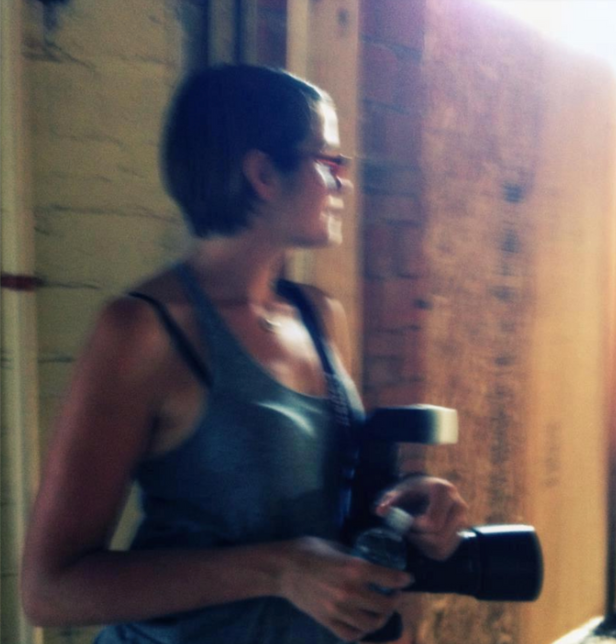 Brooke LaValley
Brooke LaValley Caveat Magister
Caveat Magister kbot
kbot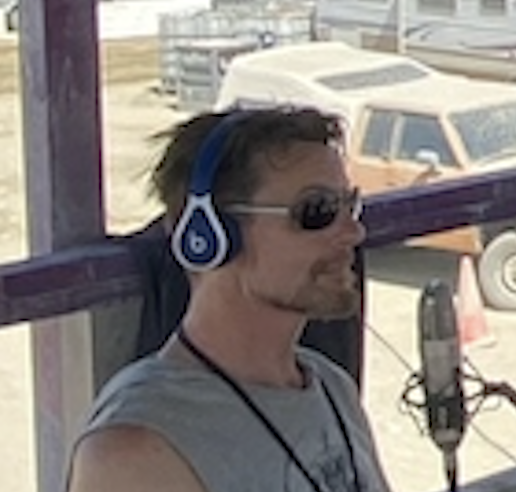 Michael Vav
Michael Vav Motorbike Matt
Motorbike Matt